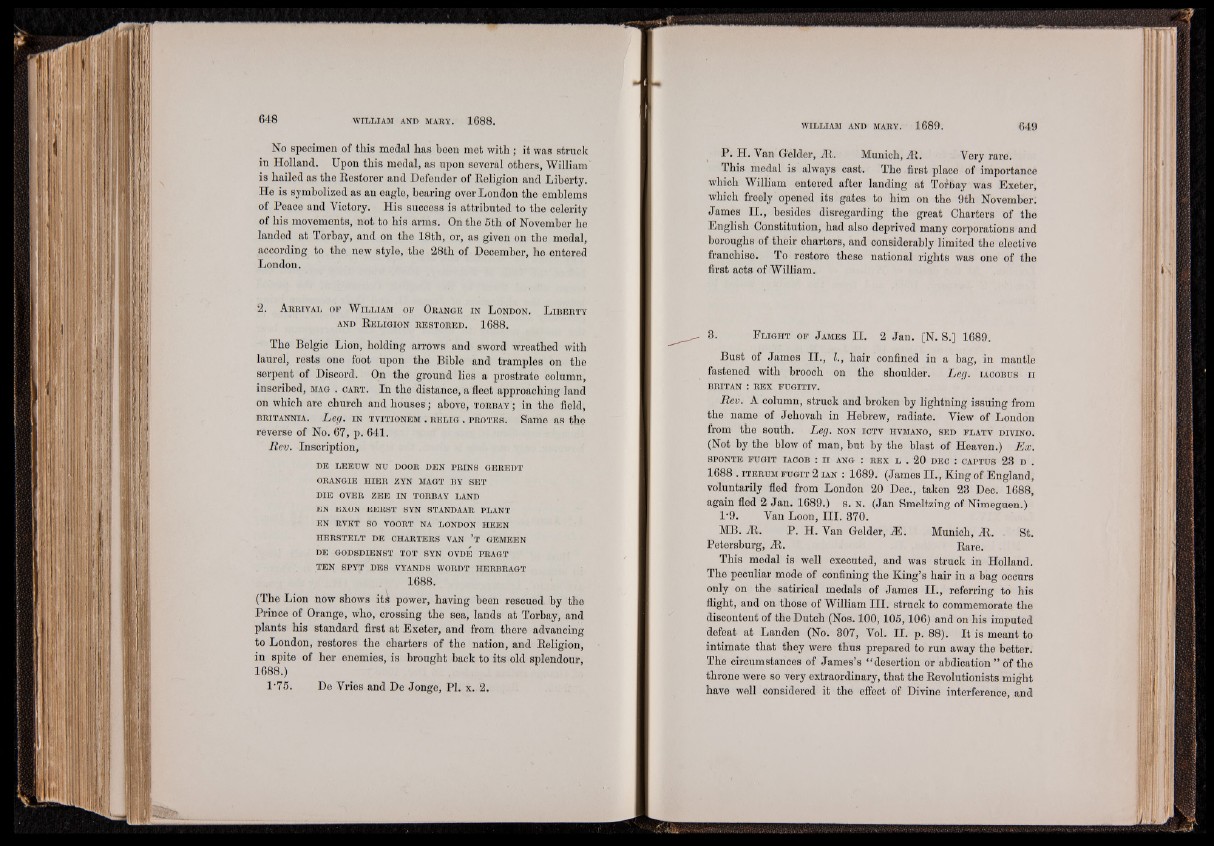
No specimen of this medal has been met with ; it was struck
in Holland. Upon this medal, as upon several others, William
is hailed as the Restorer and Defender of Religion and Liberty.
He is symbolized as an eagle, bearing over London the emblems
of Peace and Victory. His success is attributed to the celerity
of his movements, not to his arms. On the 5th of November he
landed at Torbay, and on the 18th, or, as given on the medal,
according to the new style, the 28th of December, he entered
London.
2. A r r iv a l of W il l ia m o f Or a n g e in L ondon. L ib e r t y
and R e l ig io n r e s t o r e d . 1688.
The Belgic Lion, holding arrows and sword wreathed with
laurel, rests one foot upon the Bible and tramples on the
serpent of Discord. On the ground lies a prostrate column,
inscribed, mag . c a r t . In the distance, a fleet approaching land
on which are church and houses; above, t o r b a y ; in the field,
BRITANNIA. Leg. IN tv it io n em . r e l ig . p r o t e s . Same as the
reverse of No. 67, p. 641.
Rev. Inscription,
DE LEEUW NU DOOR DEN PRINS GEREDT
ORANGIE TIIER ZYN MAGT BY SET
DIE OVER ZEE IN TORBAY LAND
EN EXON EERST SYN STANDAAR PLANT
EN RVKT SO VOORT NA LONDON HEEN
HERSTELT DE CHARTERS VAN ’T GEMEEN
DE GODSDIENST TOT SYN OVDE PRAGT
TEN SPYT DES VYANDS WORDT HERBRAGT
1688.
(The Lion now shows its power, having been rescued by the
Prince of Orange, who, crossing the sea, lands at Torbay, and
plants his standard first at Exeter, and from there advancing
to London, restores the charters of the nation, and Religion,
in spite of her enemies, is brought back to its old splendour,
1688.)
1‘75. De Vries and De Jonge, PI. x. 2.
P • H. Van G'elder, JR. Munich, JR. Very rare.
This medal is always cast. The first place of importance
which William entered after landing at Torbay was Exeter,
which freely opened its gates to him on the 9th November.
James II., besides disregarding the great Charters of the
English Constitution, had also deprived many corporations and
boroughs of their charters, and considerably limited the elective
franchise. To restore these national rights was one of the
first acts of William.
8. F l ig h t o f J am e s II. 2 Jan. [N. S.] 1689.
Bust of James II., I., hair confined in a bag, in mantle
fastened with brooch on the shoulder. Leg. iacobus i i
BRITAN : REX FUGITTV.
Rev. A column, struck and broken by lightning issuing from
the name of Jehovah in Hebrew, radiate. View of London
from the south. Leg. non io tv hvmano, bed f l a t v d iv in o .
(Not by the blow of man, but by the blast of Heaven.) Ex.
SPONTE FUGIT IACOB : II ANG : REX L . 20 DEC : CAPTUS 28 D .
1688 . it e r u m FUGIT 2 ian : 1689. (James II., King of England,
voluntarily fled from London 20 Dec., taken 28 Dec. 1688,
again fled 2 Jan. 1689.) s. n . (Jan Smeltzing of Nimeguen.)
1’9. Van Loon, III. 870.
MB. JR. P. H. Van Gelder, JE. Munich, JR. . St.
Petersburg, JR. Rare.
This medal is well executed, and was struck in Holland.
The peculiar mode of confining the King’s hair in a bag occurs
only on the satirical medals of James II., referring to his
flight, and on those of William III. struck to commemorate the
discontent of the Dutch (Nos. 100,105,106) and on his imputed
defeat at Landen (No. 807, Vol. II. p. 88). It is meant to
intimate that they were thus prepared to run away the better.
The circumstances of James’s “ desertion or abdication ” of the
throne were so very extraordinary, that the Revolutionists might
have well considered it the effect of Divine interference, and